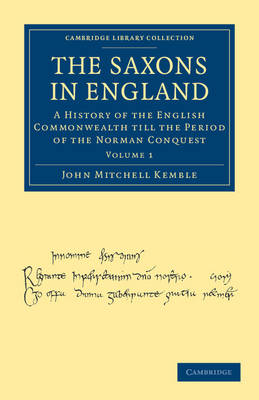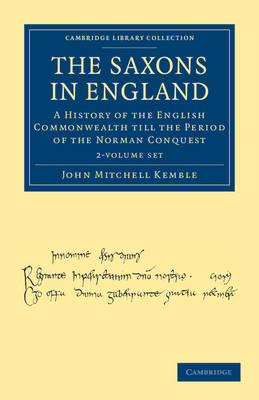Cambridge Library Collection - Medieval History
1 primary work • 4 total works
Volume 1
This monumental 1849 publication was the first detailed analysis to compare Anglo-Saxon institutions with those of other Germanic peoples. The philologist and historian Kemble (1807–57) was born into a renowned family of actors, trained at Cambridge for both the bar and the church, but devoted his career to Germanic philology and Old English. His studies resulted in several books including a Beowulf edition (1833), a pioneering six-volume edition of Anglo-Saxon charters (Codex Diplomaticus Aevi Saxonici, 1839–48), and the posthumous Horae Ferales (1863), together with articles and translations in periodicals. He also corresponded for many years with Jacob Grimm. The Saxons drew heavily on Kemble's work on the charters. This, the first of two volumes, argues for the early presence of the Saxons in Britain and investigates their laws and institutions, emphasising the relationship between land ownership and rank in the Anglo-Saxon social order.
This monumental 1849 publication was the first detailed analysis to compare Anglo-Saxon institutions with those of other Germanic peoples. The philologist and historian Kemble (1807-57) was born into a renowned family of actors, trained at Cambridge for both the bar and the church, but devoted his career to Germanic philology and Old English. His studies resulted in several books including a Beowulf edition (1833), a pioneering six-volume edition of Anglo-Saxon charters (Codex Diplomaticus Aevi Saxonici, 1839-48), and the posthumous Horae Ferales (1863), together with articles and translations in periodicals. He also corresponded for many years with Jacob Grimm. The Saxons drew heavily on Kemble's work on the charters. Volume 1 argues for the early presence of the Saxons in Britain and investigates their laws and institutions. Volume 2 addresses their impact on social institutions and power structures in post-Roman Britain.
This monumental 1849 publication was the first detailed analysis to compare Anglo-Saxon institutions with those of other Germanic peoples. The philologist and historian Kemble (1807-57) was born into a renowned family of actors, trained at Cambridge for both the bar and the church, but devoted his career to Germanic philology and Old English. His studies resulted in several books including a Beowulf edition (1833), a pioneering six-volume edition of Anglo-Saxon charters (Codex Diplomaticus Aevi Saxonici, 1839-48), and the posthumous Horae Ferales (1863), together with articles and translations in periodicals. He also corresponded for many years with Jacob Grimm. The Saxons drew heavily on Kemble's work on the charters. Volume 2 discusses how England changed under the Saxons, focusing on the powers and functions of the king, the ruling elite and the clergy, the role of the urban and rural population, and the situation of the poor.
This monumental 1849 publication was the first detailed analysis to compare Anglo-Saxon institutions with those of other Germanic peoples. The philologist and historian Kemble (1807-57) was born into a renowned family of actors, trained at Cambridge for both the bar and the church, but devoted his career to Germanic philology and Old English. His studies resulted in several books including a Beowulf edition (1833), a pioneering six-volume edition of Anglo-Saxon charters (Codex Diplomaticus Aevi Saxonici, 1839-48), and the posthumous Horae Ferales (1863), together with articles and translations in periodicals. He also corresponded for many years with Jacob Grimm. The Saxons drew heavily on Kemble's work on the charters. This, the first of two volumes, argues for the early presence of the Saxons in Britain and investigates their laws and institutions, emphasising the relationship between land ownership and rank in the Anglo-Saxon social order.


